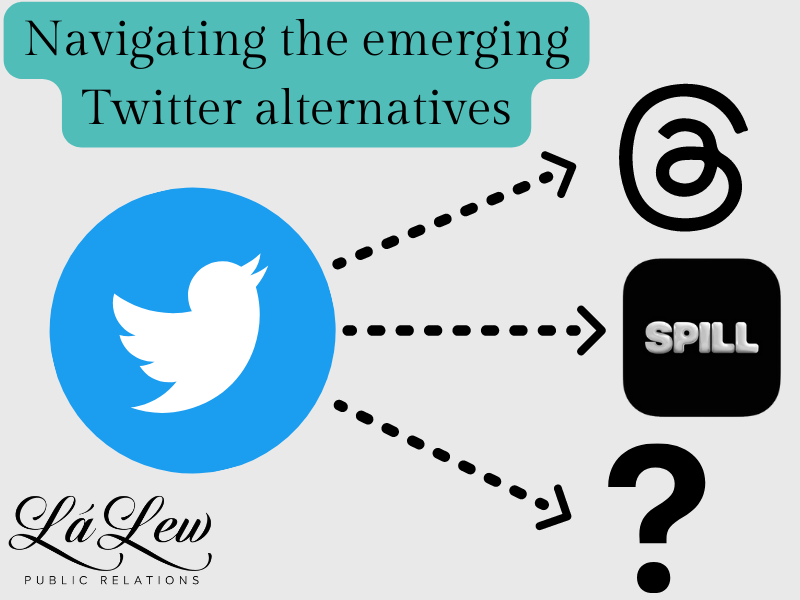What the newest Twitter alternatives mean to you as a Public Relations Professional
Do you feel overwhelmed by all the Twitter alternatives you’ve been hearing about, whether it be as a professional or just a user? You’re not alone. With the onslaught of Twitter “replacements” that have gotten attention in recent months, many people have also become fatigued. To some, the new apps are merely imitating what Twitter is known for instead of doing anything unique or innovative.
At the same time, however, it’s easy to feel the need to have a presence on all the new emerging platforms, whether you’re doing so for personal or professional reasons. When looking for potential Twitter alternatives, it’s important to remember what professionals identify as the original app’s biggest strengths: its ability to allow people to engage in conversations and access to quick, direct interaction with customers.
At LáLew Public Relations, we recognize the importance of staying on top of the latest social media trends and developments. For professionals in public relations, it's essential to stay up to date on what social media platforms are popular, why they get attention and how they could potentially benefit yourself or your brand.
Here are some popular Twitter alternatives and what they may mean to you as a professional:
Threads
If you’ve been keeping up with the latest news in technology recently, you’ve most likely been hearing about Threads. Threads is Meta’s “Twitter clone” that is the latest platform to receive attention as a potential Twitter alternative. To make an account here, however, one needs to also have an Instagram account.
Threads has very similar features to Twitter. According to its description on the App Store, “you can follow and connect directly with your favorite creators and others who love the same things — or build a loyal following of your own to share your ideas, opinions and creativity with the world.”
If you want the Twitter experience but cannot trust the original app, then Threads might be the place for you.
Bluesky
Bluesky is another platform that almost appears to be almost mirroring Twitter and its features. The biggest difference is that the app is still in its beta stages, meaning that users will need an invite code to make an account. Another key difference is that the app is decentralized, meaning that it is meant to host different communities that serve different functions and interests.
When Bluesky is finally released to the public, it will offer similar benefits to what Twitter already has, but with some unique alterations in its foundation. The question is: can Bluesky stand on its own? Also, what will the state of social media platforms even be when the app is released to the public?
Spill
For brands that want a content-first approach to their social media strategy, Spill might be the platform they are looking for. Spill is a Black-owned platform created by former Twitter employees with a goal of protecting marginalized communities through its guidelines, something that other platforms are frequently criticized for not doing. Spill also prioritizes a content-first approach and wants users to express themselves “by easily combining text with image, video, GIF and more,” according to the platform’s App Store page.
Many industries could potentially benefit from establishing themselves on Spill in its early life, especially those aiming to connect with Millennials, Gen Z and Gen Alpha.
Yes, despite the fact that many people are quick to announce their movement to new social media platforms after controversial changes to Twitter, the original app is still very much alive and active. According to Business of Apps, Twitter still has “368 million daily active users” as of May 2023. That’s not a number brands or individuals want to ignore.
Twitter’s future may be a bit unpredictable right now, but in the present, it’s just too hard for many to give up and ignore completely.

